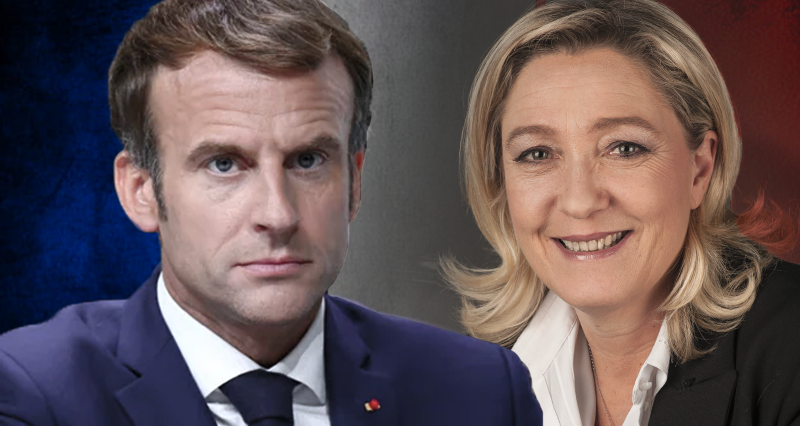The first round of the Presidential elections in France took place in the shadow of the Russia-Ukraine war.
According to the official results, Emmanuel Macron, who received 27.6% of the votes, and Marine Le Pen, who received 23.4% of the votes, were the candidates who made it to the second round.
The first round’s surprise was that Jean Luc Mélenchon, who had a hard-left rhetoric, came third with 22% of the votes.
Eric Zemmour, who made a name for himself before the elections, performed successfully in the first election in which he participated, with 8% of the vote.
The elections, held at a time when the world is going through a major period of change, provide important clues about the preferences of French voters in domestic and foreign policy.
The rise of anti-NATO candidates
Based on the results of the first round of elections, it is possible to make the following fundamental evaluations about the foreign policy tendencies of the French people.
- In the elections held at a time when Russia and the West came face to face over Ukraine and the fate of NATO was being debated, the majority of the French people voted for candidates that opted for distance to NATO. The combined votes of Le Pen, Mélenchon and Zemmour as well as the big and minor anti-NATO candidates in the first round exceed 50%. This shows the French people’s opposition to NATO and, accordingly, the US, whose shadow looms over their country.
- Another common feature of the candidates that maintain distance to NATO is the following: they pursue policies to improve relations with Asian countries, especially Russia and China. It is true that cracks began to appear between the candidates about the relations to Russia After the outbreak of the Russia-Ukraine war. Still, an examination of their political programs shows they advocate the policy of balancing between the Atlantic and the East. Thus, it would not be wrong to say that a will to reject the Atlantic-focused world has become stronger in France.
- Candidates, who have distanced themselves from NATO, also criticize France’s interventionist policies in Africa and the Middle East at certain points. The political movement represented by Marine Le Pen, second in the elections, was not only against NATO’s intervention against Libyan leader Muammar Gaddafi. It was also father of Le Pen, who at that time sent messages of support to the followers of Gaddafi resisting in Sirte. Mélenchon, on the other hand, has frequently criticized France’s tailing of the USA in the Middle East – not concerning Libya but also in Syria.
Neo-liberal center losing power: electing Macron will only be a Pyrrhus victory
The French people went to the polls at a time when problems arose from the Russia-Ukraine war, the economic crisis deepened, the Yellow Vests protests emerged and the cultural integration has became unsolvable. The results of the first round are important as they also reflect the main tendencies of the French in domestic policy:
- The total votes of “left liberal” Macron and “right liberal” Valery Pécresse, together with similar candidates who defend western-centered globalization and neoliberal policies, do not exceed 36%. Pen, Mélenchon and partially Zemmour, who support a national economic model, exceeds 50%. The election results show that the French people welcomed the anti-neoliberal policies that emerged from the Yellow Vests protests.
- The first round results show that the candidates who defended the French type of “laicism” against the imposition of the British model of secularism received most of the votes. Another common feature of Le Pen, Mélenchon and partially Zemmour is their insistence on the Nation-State model. Regarding the social state, it can be said that Mélenchon followed more statist policies.
- Le Pen and Zemmour show that a significant part of the French public sees the French state’s integration policies against foreigners and 2nd Generation immigrant children as inadequate.
Transition between Le Pen and Mélenchon voters
In light of the previous elections, it can be said that Macron’s chance has a greater chance than Le Pen to win in the second.
In the 2002 and 2017 elections, when the Le Pen family reached the second round, first Jacques Chirac and then Macron had won the left votes against Le Pen with the slogans ‘unity against the fascism’.
Today, it seems that, 20% of those who voted for Mélenchon, will decide the fate of the elections in the second round. Surveys show that in spite of Mélenchon’s calls to vote for Macron versus Le Pan, at least 30% of his electors could vote for Le Pen.
This situation also marks the transition between the bases of the “far-right” Le Pen and the “far-leftist” Mélenchon, in the fashionable phrase.
It is difficult to predict what might change until April 24.
The two-round electoral system and the candidates’ passion for Cold War-era concepts, “extreme right” and “extreme left”, which we can describe as facilitation reflects France’s predicament.
The results show that opposition to the USA, NATO and neoliberalism is on the rise in France. In such an environment, the election of Macron can only be described as a Pyrrhic victory. Even Macron seems likely to be caught in the rising anti-Atlantic wave.
In brief, the election results show that the majority of the French people voted against the US shadow in a world that is divided into pro- and anti-Washington.

















Leave a Reply